Four minutes and 17 seconds remained in the Chiefs' season.
Kansas City trailed the Patriots by two touchdowns in the AFC divisional playoff game in January but had the ball at the New England 47-yard-line.
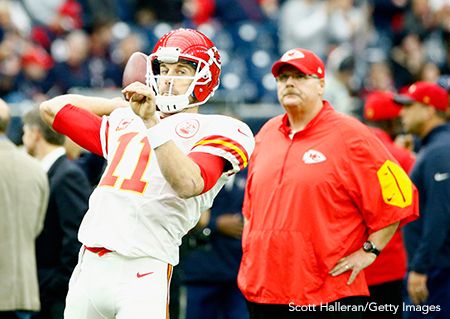
Though Chiefs running back Charcandrick West eventually scored a touchdown with 1:13 left and cut the lead to 27-20, the Chiefs burned more than three minutes, effectively ending any chance of winning and leading to an offseason of criticism of both their two-minute offense and play-calling in general.
"It was an area of focus," Chiefs quarterback Alex Smith said, "clean up some language and communication as far as cutting words out and things like that. Just operate a little faster."
To accomplish that goal, the Chiefs have addressed it -- in a seemingly confounding way.
To replace Doug Pederson, last year's offensive coordinator, the Chiefs will employ two co-offensive coordinators, Brad Childress and Matt Nagy. And head coach Andy Reid will call the play before having Nagy relay it to the audio device in the quarterback's helmet.
Having two people bark out one play in succession -- when a play clock lasts only 40 seconds, and the radio transmitters automatically shut off with 15 seconds left -- seems extremely inefficient, but both the Chiefs' coaches and players swear by this system.
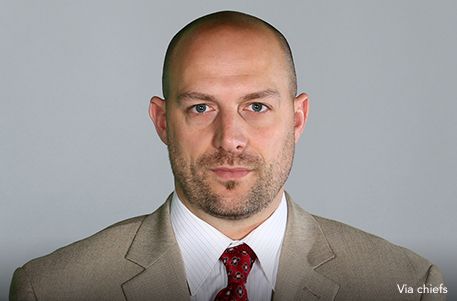
Kansas City's quarterbacks told ThePostGame that they haven't had any issues and they have been receiving the plays from Nagy in plenty of time to make their checks and reads.
"Coach Reid makes it a lot easier for you," Nagy said. "He really helps me, gets some plays into me quick."
The Chiefs' two coordinators don't share duties like some college teams that have recently employed separate running game and passing coordinators.
"It's not divvied up like that," said No. 2 quarterback Nick Foles. "They sit there together, they go through the film together, they develop the gameplan together."
But whom do the quarterbacks approach when they have a question?
"Whoever walks in front of you first," Foles said, "that's who you ask."
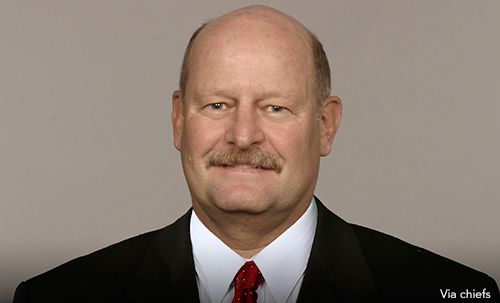
Childress, who will be in the coaches' booth during games, is the more experienced of the two. The quarterbacks coach and offensive coordinator under Reid in Philadelphia from 1999 to 2005, he was the Packers' first choice as head coach after the 2005 season. But Childress opted for Minnesota where he coached the Vikings from 2006 to 2010.
A former Arena Football League quarterback, the 37-year-old Nagy, who will be on the sidelines during games, also has Philadelphia roots. After serving as the Eagles' offensive quality control coach, he followed Reid to Kansas City to become the Chiefs' quarterback coach the past three seasons.
Thus, each is well-versed in Reid's system.
"It's still Big Red's offense," Chiefs tight end Travis Kelce said.
Last year the source of the Chiefs' play-calling remained a curiosity as well.
It wasn't until the offseason, when the Eagles hired Pederson as head coach, that it was revealed that Pederson called the second-half plays of every game after Oct. 25.
Insiders believe, however, that Reid's fingerprints were all over Kansas City's play-calling the entire season.
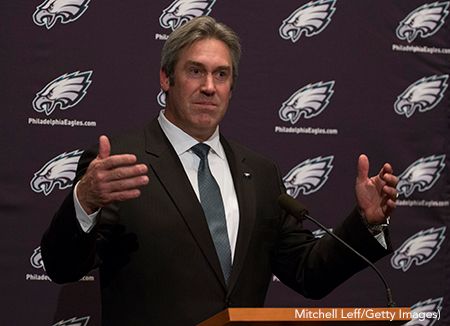
Pederson -- whose hiring by the Eagles resulted in the Chiefs' restructuring of their offensive coordinator position -- claimed he was in charge of the much-maligned offensive drive against New England. But Reid came to his defense when pressed about it this offseason.
"That's not Doug's fault," Reid said. "That had nothing to do with him. That's my responsibility."
To begin that final drive, Smith rushed for two yards on 1st and 10 and wisely ran out of bounds to stop the clock, but then the Chiefs huddled, wasting 23 seconds.
On the next completion, rookie wide receiver Chris Conley fought for extra yards and was tackled inbounds. That burned 26 seconds.
And finally, despite having a 1st and goal at the Patriots' 1-yard-line and all of their timeouts, the Chiefs needed four snaps and took 42 seconds to score.
Smith said the issues in New England occurred for several reasons. In his third year in the same offense, the playbook and two-minute options had continued to expand. Injuries to receivers, including Jeremy Maclin, left Kansas City with Conley, Albert Wilson and Jason Avant as their primary receivers during a long drive.
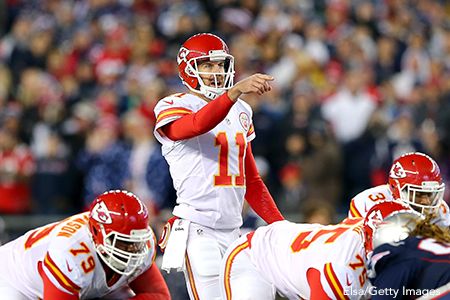
"Those guys got gassed after the game," Smith said. "On the road, a playoff game, injuries, your numbers are down, young guys are in, it all just kind of piled up ... some inefficiencies kind of showed."
The Chiefs-Patriots game, though, was not the first time a Reid-coached team has been criticized for running an inefficient two-minute offense during a crucial game. Down by 10 points to New England with 5:40 left in Super Bowl XXXIX, Philadelphia didn't score a touchdown until 1:55 remained.
The play-calling was so slow that some alleged that Eagles quarterback Donovan McNabb was too ill, even vomiting, to call the plays correctly.
Terrell Owens blamed McNabb's conditioning for the problems on the drive, one of the many acrimonious incidents that led to Philadelphia releasing T.O.
Reid's Kansas City quarterbacks, however, expressed confidence in their ability to handle end-of-game situations. And in the third preseason game, which is considered to be the one that most mirrors regular-season conditions, the Chiefs' starters scored a touchdown during a 23-7 victory against the Bears' starters right before the half.
"[It's been a] great offseason when it comes to some of the two-minute, no-huddle stuff," Smith said.
Foles did not sign with the Chiefs until the first week of August, making it a challenge to quickly master an offense that has about 403 pass plays.
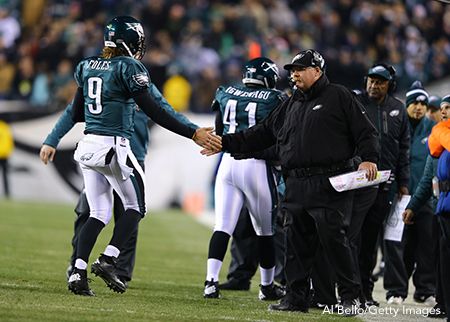
Making it even more daunting is the fact that the West Coast Offense that Reid adapted from Green Bay's Mike Holmgren, who learned it from San Francisco's Bill Walsh, is known for its extensive verbiage.
This offseason the Chiefs have claimed to cut plays from the two-minute offense and verbiage of the calls.
"Well, it probably did get a little wordy," Reid said.
Another factor that may help Foles is that he spent his rookie year in 2012 with Reid in Philadelphia.
"There is similarities that give me a base," Foles said. "But there's a lot of evolution through this offense that has happened in the last four years."
Smith also has some background in another facet of the 2016 offense. He's had a coach relay the play to another coach before it reaches him, though that precedent was misguided.
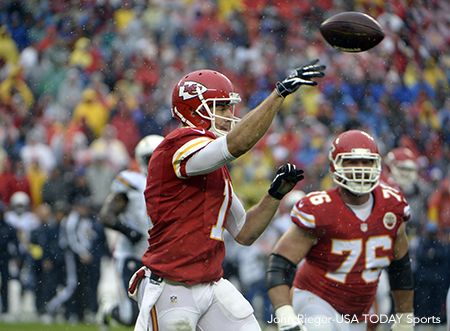
While Smith started 10 games for the 49ers in 2010, San Francisco offensive coordinator Jimmy Raye, made the call into the headset of quarterbacks coach Mike Johnson, who was on the sideline and relayed the information into Smith's helmet.
The 49ers lost the first five games of the season, their offense ranked 24th in the league, and head coach Mike Singletary was fired before the end of the season.
But the 2016 Chiefs are much better than that 6-10 49ers team. Coming off an 11-5 season that featured five Pro Bowlers on defense, Kansas City returns explosive running back Jamaal Charles, who missed most of last year with a knee injury.
"There's a lot of talented guys on this team," Foles said. "It's pretty cool to be a part of."
Reid's Chiefs likely will return to the postseason. But come January, if they are trailing late in a road playoff game, and the clock is winding down, the question remains: How will the offense respond?
Follow Jeff Fedotin on Twitter @JFedotin.





